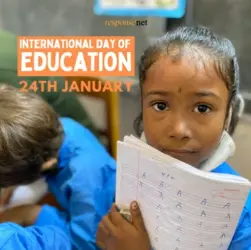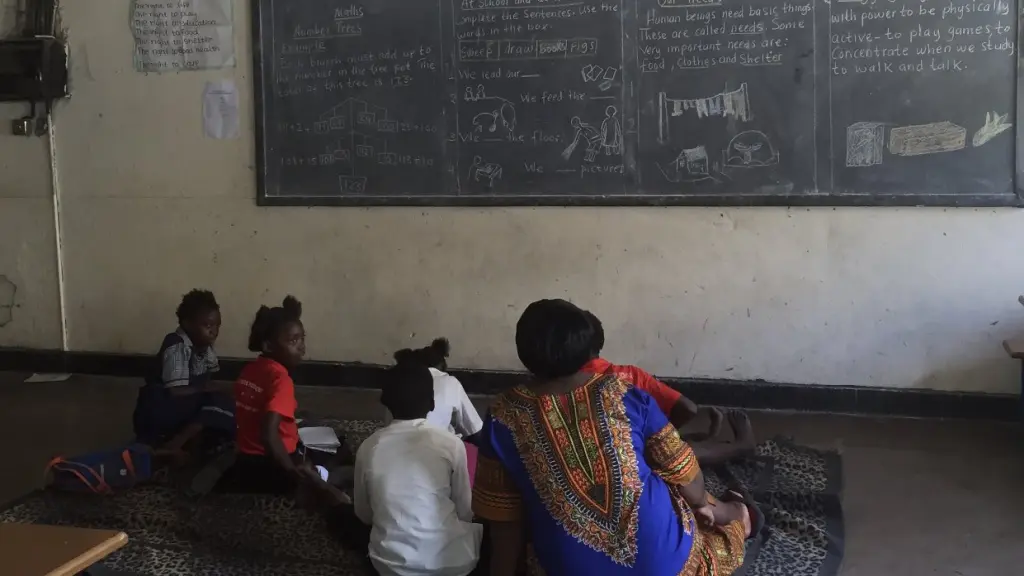 International Day of Education 2022 will be celebrated under the theme “Changing Course, Transforming Education.” The celebration, led by the UN Educational, Scientific and Cultural Organization (UNESCO), aims to showcase the most important transformations that have to be nurtured to realize everyone’s fundamental right to education and build a more sustainable, inclusive and peaceful futures. Here we look at the purpose of education and the Sathya Sai Education in Human Values.
International Day of Education 2022 will be celebrated under the theme “Changing Course, Transforming Education.” The celebration, led by the UN Educational, Scientific and Cultural Organization (UNESCO), aims to showcase the most important transformations that have to be nurtured to realize everyone’s fundamental right to education and build a more sustainable, inclusive and peaceful futures. Here we look at the purpose of education and the Sathya Sai Education in Human Values.
The right to education is enshrined in article 26 of the Universal Declaration of Human Rights. The declaration calls for free and compulsory elementary education. The Convention on the Rights of the Child, adopted in 1989, goes further to stipulate that countries shall make higher education accessible to all. When it adopted the 2030 Agenda for Sustainable Development in September 2015, the international community recognized that education is essential for the success of all 17 of its goals. Sustainable Development Goal 4, in particular, aims to “ensure inclusive and equitable quality education and promote lifelong learning opportunities for all” by 2030.
International Day of Education 2022 aims to generate debate around how to strengthen education as a public endeavour and common good, how to steer the digital transformation, support teachers, safeguard the planet and unlock the potential in every person to contribute to collective well-being and our shared home.
Real education is education in which both the spiritual and the secular education are delivered to serve new generations. The mainstream educational model, originally developed 200 years ago, was an industrial model that does not serve our children’s needs for the 21st Century. For this we need to go beyond the industrial model. We need to evolve the very best model that we can. Education in Human Values is indeed the best model – it has a philosophy, a pedagogy, a training program for the teachers and well developed material for the children. As in all education Education in Human Values is steadily evolving. An education that does not evolve and does not meet with the needs of the new generation does not serve that generation as it should. All countries are recognising the need for curricular reform and the best reform they can make is to take up Education in Human Values.

Sathya Sai Education in Human Values
According to the teachings of Sathya Sai the primary purpose of education is not accumulating information and scholarship, nor developing specific skills for jobs nor attaining a position in the society nor earning a livelihood. Education has twin functions – it is for the Spirit as much as it is for physical life. Whilst the emphasis in education over the last hundred years has been on preparing us for secular life, the primary purpose of education is cultivating capacities that are uniquely human and that define our humanness. A central principle of Sathya Sai Education is that our purpose in life cannot be served until we are able to form a proper relationship with Oneness or Divinity. For this we need to develop an inner vision to apprehend the Oneness or Divinity. Subjectively this is working to attain an inner state of harmony of head, heart and hand, an inner integrity that echoes the state of Oneness.
At the same time spiritual work is required for us to be able to apprehend the Oneness of all creation. Personal transformation and elevation of consciousness are prerequisite for a glimpse of Oneness. This is developed through the training of mind and heart. This, according to Sathya Sai, is the fundamental purpose of education when it is combined with spirituality. It is through such education that the ordinary gross, inflexible, distracted and scattered mind is made focussed and flexible and the hard and callous heart is made tender and soft. Living a life of purity and morality, underpinned with the practice of a universal ethic of respect, love and caring for the whole of creation is a prerequisite for cultivating even the rudiments of inner vision and an abiding consciousness of Oneness.
There is a vital connection between Oneness or Divinity and values we use in everyday life. This is because Oneness or Divinity is the Ultimate Value and all other values are derivative. Sathya Sai teaches that Oneness or Divinity is the underlying reality of all creation, both animate and inanimate. This great principle is acknowledged tacitly or consciously in the values we regard as good in everyday interactions. Oneness or Divinity imbues everything in creation with an intrinsic value. In being grounded in Oneness or Divinity the connection or relationship between the various “parts” within the One is Love. Love therefore is a super ordinate value and regarded by Sathya Sai as the undercurrent of all other values. Love as action is Right Conduct, Love as speech is Truth, Love as feeling is Peace and Love as understanding is Non-violence.
Sathya Sai Education in Human Values is based on the cultivation of these five inherent values of Love, Right Conduct, Truth, Peace and Non-violence. These values correspond to the highest expressions of the five human personality domains physical (Right Conduct), intellectual (Truth), emotional (Peace), social (Love) and spiritual (Non-violence). We constantly seek to engage in the exercise of these highest values as they are that which is fundamental to our human personality. They are a link to our spiritual connection with our own Divine core as well as Omnipresent, Omnipotent Divinity. Practice of these values enhances not only our humanness but contact with Divinity as well. Sathya Sai teaches that it is possible to abide in Oneness or Divinity from moment to moment by cultivating the five Human Values. For the practice of these values purity of heart and mind are prerequisite. We know we are practising these values by our conscience which is the ever present voice of Divinity within us. It is heard most clearly when we have a pure heart and unsullied mind.
The pedagogy of Sathya Sai Education in Human Values develops all the five personality domains – the physical, the intellectual, the emotional, the social and the spiritual and cultivates all the known intelligences. This pedagogy contrasts with that of secular education which focuses mainly on the intellectual and physical domains and to lesser extent on the emotional but does little to develop the spiritual. In Sathya Sai Education in Human Values both the parents and the teachers are also engaged in actively pursuing a spiritual path themselves. Children and youth are inducted into spirituality not from scriptures as much as from the experience of Divine attributes in the parents and teachers who are exemplars of Human Values. Words of parents and teachers carry little weight about a value if they themselves do not practice the value and research shows that children acquire values, attitudes and personality traits from simply observing significant adults in their lives rather than by listening to them. In Sathya Sai Education in Human Values parents and teachers create an atmosphere of love and nurturance as well as of responsibility and accountability, a balance of “love and law”. This is conducive to optimal development. They cultivate caring, concern and empathy and unfold self-awareness and wisdom intrinsic in the child. Sathya Sai Baba calls this process of drawing out the inherent values in the child, Educare.
Both the parents and teachers have primarily spiritual roles that lead to their own spiritual growth. For the teachers their work is not a livelihood; it is a calling in which the most essential task is to enable the students to redefine and discover themselves as spiritual beings with capacity of emotional control, patience, perseverance, discipline and social conscience. Sathya Sai Education in Human Values specifically promotes academic diligence, virtuous behaviour, a spirit of service and sacrifice, social conscience and universal love.
For the parents family life is a means of working towards their own personal spiritual purpose in life. Sathya Sai teaches that family life is like a bridge. We do not build a home on a bridge but use it for crossing over from one side to the other. In the same way family life presents moment to moment opportunities of spiritual growth and we can utilize our time in the family to cross over from mundane life to spiritual life by working on our self-transformation through rendering loving service by discharging our full role as parents. The parents are asked, as architects of family health, to consciously orchestrate the dynamics of home on the five human values. The pedagogy they use is not the formal pedagogy of the school but the informal pedagogy, equally if not more powerful, than the formal pedagogy of the school teacher.
Download Conceptual Framework for Sai Spiritual Education
![]()


